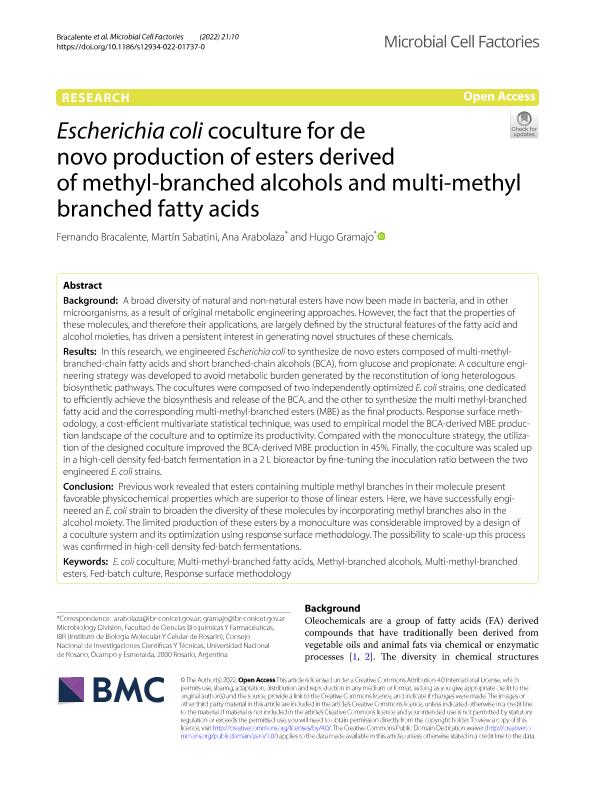Artículo
Escherichia coli coculture for de novo production of esters derived of methyl-branched alcohols and multi-methyl branched fatty acids
Fecha de publicación:
01/2022
Editorial:
BioMed Central
Revista:
Microbial Cell Factories
ISSN:
1475-2859
Idioma:
Inglés
Tipo de recurso:
Artículo publicado
Clasificación temática:
Resumen
Background: A broad diversity of natural and non-natural esters have now been made in bacteria, and in other microorganisms, as a result of original metabolic engineering approaches. However, the fact that the properties of these molecules, and therefore their applications, are largely defined by the structural features of the fatty acid and alcohol moieties, has driven a persistent interest in generating novel structures of these chemicals. Results: In this research, we engineered Escherichia coli to synthesize de novo esters composed of multi-methyl-branched-chain fatty acids and short branched-chain alcohols (BCA), from glucose and propionate. A coculture engineering strategy was developed to avoid metabolic burden generated by the reconstitution of long heterologous biosynthetic pathways. The cocultures were composed of two independently optimized E. coli strains, one dedicated to efficiently achieve the biosynthesis and release of the BCA, and the other to synthesize the multi methyl-branched fatty acid and the corresponding multi-methyl-branched esters (MBE) as the final products. Response surface methodology, a cost-efficient multivariate statistical technique, was used to empirical model the BCA-derived MBE production landscape of the coculture and to optimize its productivity. Compared with the monoculture strategy, the utilization of the designed coculture improved the BCA-derived MBE production in 45%. Finally, the coculture was scaled up in a high-cell density fed-batch fermentation in a 2 L bioreactor by fine-tuning the inoculation ratio between the two engineered E. coli strains. Conclusion: Previous work revealed that esters containing multiple methyl branches in their molecule present favorable physicochemical properties which are superior to those of linear esters. Here, we have successfully engineered an E. coli strain to broaden the diversity of these molecules by incorporating methyl branches also in the alcohol moiety. The limited production of these esters by a monoculture was considerable improved by a design of a coculture system and its optimization using response surface methodology. The possibility to scale-up this process was confirmed in high-cell density fed-batch fermentations.
Archivos asociados
Licencia
Identificadores
Colecciones
Articulos(IBR)
Articulos de INST.DE BIOLOGIA MOLECULAR Y CELULAR DE ROSARIO
Articulos de INST.DE BIOLOGIA MOLECULAR Y CELULAR DE ROSARIO
Citación
Bracalente, Fernando Gabriel; Sabatini, Martín; Arabolaza, Ana Lorena; Gramajo, Hugo Cesar; Escherichia coli coculture for de novo production of esters derived of methyl-branched alcohols and multi-methyl branched fatty acids; BioMed Central; Microbial Cell Factories; 21; 1; 1-2022; 1-17
Compartir
Altmétricas
Items relacionados
Mostrando titulos relacionados por título, autor y tema.
-
Jaffrennou, B.; Soulé, Ezequiel Rodolfo ; Méchin, F.; Borrajo Fernandez, Julio ; Pascault, J.P.; Williams, Roberto Juan Jose (Elsevier, 2004-09)
-
Dulbecco, Andrea Belen ; Moriconi, Debora Elizabeth ; Lynn, María Soledad ; McCarthy, A.; Juarez, Marta Patricia ; Girotti, Juan Roberto ; Calderón Fernández, Gustavo Mario (Wiley Blackwell Publishing, Inc, 2020-10)
-
Mussari, Lelia María Ester; Canzonieri, Salvador Humberto; Mariano, Alejandra Beatríz (Elsevier, 2017)




